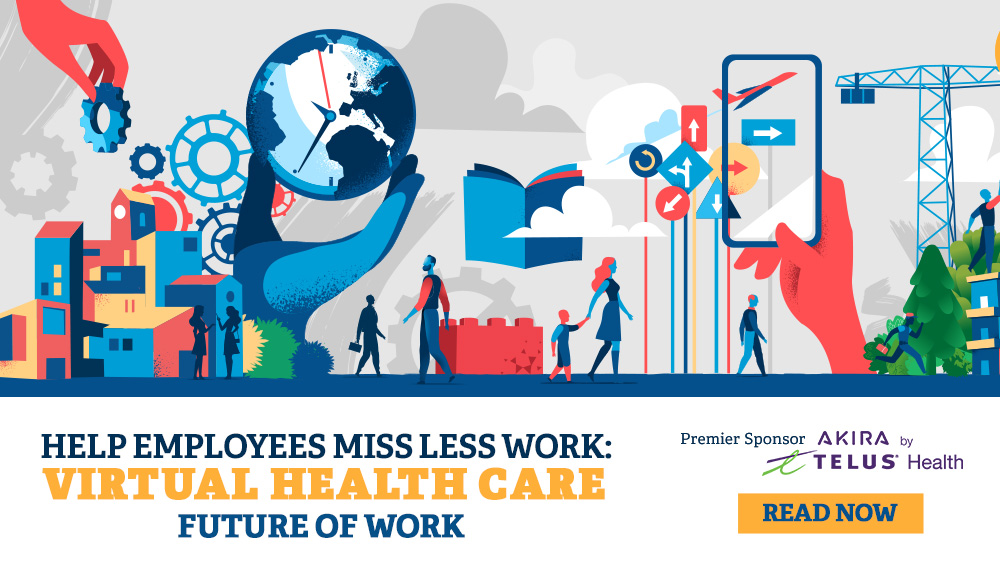

News
Employee Wellness
Future of Work
Health & Safety
HR Technology
Virtual health care comes of age during COVID-19
Sponsored


In retrospect, the shift to virtual health care as a result of the COVID-19 pandemic seems inevitable.
During months of lockdown and in-person meeting restrictions, at least half of Canadians used virtual health care, according to a recent Canadian Medical Association poll, with a whopping 91 per cent satisfaction rate.
“It’s brought some normalcy to virtual care,” said April Stewart, a nurse practitioner in Kelowna, B.C., during a Talent Canada roundtable as part of the Future of Work: Virtual Health Care event on Nov. 19.
As head of clinical services with Akira by TELUS Health, a national on-demand virtual care solution, Stewart worked in virtual care before the pandemic.
At that time, there was apprehension from providers and patients alike who didn’t fully understand how it could go mainstream, she said. “But with COVID it’s definitely become the norm.”

Delivering care through the screen of a computer also means removing some of the existing barriers of accessing health, say virtual health-care experts. (Halfpoint/Adobe Stock)
Better health outcomes
The anxiety, stress and loneliness brought on by the pandemic saw social workers and therapists receive an influx of patients in a virtual health-care setting.
“We’ve experienced such a surge in clients since the start (of the pandemic) and we’ve really been able to support many, many people with a wide range of concerns,” said Dylan Zambrano, a registered social worker in Toronto.
And that quick shift on a massive scale has resulted in improved health outcomes, the roundtable participants pointed out.
“It’s been actually quite astounding that some people have actually gotten better (during) the pandemic,” said Kathee Andrews, a Toronto psychotherapist and family physician with 30 years of experience.
Virtual care has allowed patients to book more appointments, save time on commuting, and avoid the stress of having to book long blocks of time off from work.
And that’s where one of the trade-offs of virtual care lies — while Andrews notes that virtual care means missing on certain subtleties of the patient’s body language, it allows for more frequent appointments.
“I’d choose virtual (health) and having the sessions more frequently and more regularly over infrequent sessions in person,” she said.
To view the on-demand sessions from the Future of Work: Virtual Health Care event, visit https://www.talentcanada.ca/virtual-events/future-of-work-virtual-health-care.
Improving accessibility
Delivering care through the screen of a computer also means removing some of the existing barriers of accessing health.
“We’re seeing people have a healthier balance and they’re being more proactive with their health because taking an afternoon off work or accessing care isn’t as challenging as it used to be,” Stewart said.
“We’re seeing people are more compliant with their treatment recommendations, because they have better access to care than they’ve most likely ever had before.”
During a global pandemic, virtual health care adds a layer of safety, particularly for older and immunocompromised patients.
For people struggling with anxiety and depression, that barrier can take the form of the stigma attached to going to a clinic or having the strength to get there.
Increased adoption
Virtual care can be effectively used across the medical field, noted Matt Sheldon, a registered physiotherapist in Collingwood, Ont.
“We surprised ourselves as physiotherapists about how effective it has been, and we’ve had great feedback from our clients,” he said.
While virtual care has been around in some version for over 10 years, it hadn’t seen widespread adoption.
“Unfortunately, it’s taken a pandemic to really prove to many people that many forms of health care can be just as effective as in-person health care, and I think both practitioners and clients are starting to notice that,” Zambrano said.
And for specific assessments, critical or specialized care that has to happen in person, virtual health care providers can perform efficient triage.
That alleviates any concern that virtual health care can’t be as effective as in-person care.
“As health-care professionals, it’s our duty to be giving the best form of care in whatever way that is available to that client,” Sheldon said.
Towards the future
The lessons learned during the pandemic will enable doctors to better direct patients towards virtual, in-person — or a hybrid of the two, according to Sheldon.
But if virtual care removes some barriers, it’s also creating new ones, particularly for communities that don’t have access to reliable, high-speed Internet.
“It’s encouraging to see the government come through with announcements about multiple billions of dollars to invest in that infrastructure and democratize it, which will of course lay the groundwork for the expansion of virtual care,” said Joe Whitney, a product manager at Manulife in Waterloo, Ont., who oversees their virtual care product.
A massive adoption of virtual care requires provinces to provide clarity around virtual billing codes and the long-term virtual health-care approaches that need to be embedded in health-care curricula, he said.
“I call them limitations now, but they’re not insurmountable,” said Whitney. “They just need to be addressed.”
For employers to embrace and promote virtual care employees can access, it’s about communication first, said François Parent, facility management leader with Equinor Canada in Calgary, Alta.
Managers need to understand the content of the program, its usefulness, and the productivity that will result from it, he said.
With a large number of health and wellness apps, blogs and services, virtual health-care providers have to see themselves as curators of the best, most effective services, said Whitney.
“There’s just so much noise and apps and services coming forward these days that you don’t necessarily know what is the quality of these companies,” he said.
Pierre Chauvin is a freelance writer in Victoria, B.C.
Print this page